by Jill & Sarah | Sep 28, 2018 | In The Loop
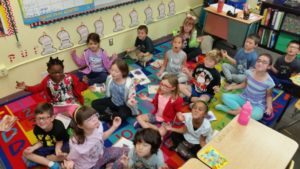
Yoga
History & Geography
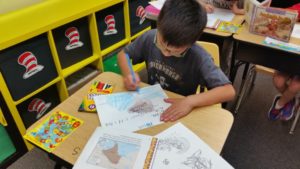
Making maps
This week we learned more about ancient India. The class discussed the first civilizations of India and drew and labeled a map of ancient India, including important geographical features. We learned about the 3 important gods of Hinduism: Brahma, Vishnu, and Shiva, and what they represent. The class was eager to practice some yoga poses and had fun learning about the Festival of Lights, Diwali.
Our objectives:
• understand the Aryan invasion of ancient India
• identify Hinduism as an important world religion
• recognize popular Hindu customs
• understand the importance of the Ganges River
• identify Diwali, the Festival of Lights
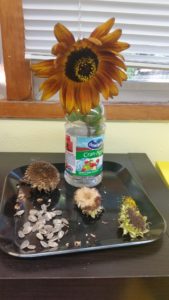 Science
Science
This week in our science domain Cycles in Nature, we learned about the life cycle of a tree. The students went on a walk around the school and looked at different types and stages of trees. They made a Venn diagram comparing and contrasting the life cycle of trees to sunflowers. We also read the book “The Giving Tree” and had a class discussion about the cycles that were included in this story.
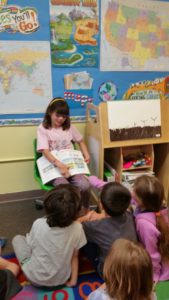
Sharing science from home
Our objectives were to:
• explain that a cycle is a sequence of events that repeat itself again and again
• explain the effects of seasonal changes on plants and animals
• define the term life cycle
• identify the stages of the life cycle of a tree and compare and contrast it to the life cycle of a sunflower.
Spelling and Writing
In our journals we used the idiom of the week, ” I’m all ears” and wrote about what topics of conversation keep our attention. I met with both spelling groups this week to go over their new sorts. We had a practice test on Friday.
La lectura
This week we read la biblioteca.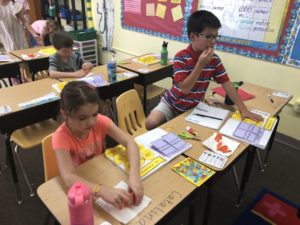
Our weekly objectives were to:
- use the comprehension strategies making connections and making predictions while we read the story the first time
- use the comprehension skill Drawing Conclusions while we read the story the second time
- recognize the /g/ spelling for the letter g
- learn and practice using action verbs
Our PUF for next week are: dice, cerca, cinco, salt, suben, sábado
Las matemáticas
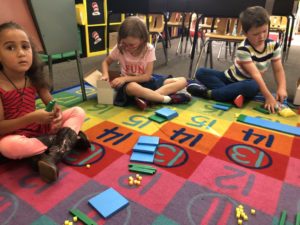 This week we took our first math test and began Chapter 2: Addition up to 1,000. Our weekly objectives were to:
This week we took our first math test and began Chapter 2: Addition up to 1,000. Our weekly objectives were to:
- use base-ten blocks to add numbers without regrouping
- use base-ten blocks to add numbers with regrouping in the ones
- add up to three-digit numbers without regrouping
- add up to three-digit numbers with regrouping in the ones
Specialists:
Music:
In September we worked on rhythm – note and rest counting, recognition, writing, and playing. We also reviewed the dynamics loud and soft (Forte and Piano) that we learned last year.
In October we will delve into tonality by singing melodies, introducing harmony, and listening for major and minor sounds. We will connect rhythm and melodic elements by playing the xylophone. We will also learn about the composer Antonio Vivaldi, and hear the music he wrote for the Autumn season!
by Jill & Sarah | Sep 21, 2018 | In The Loop
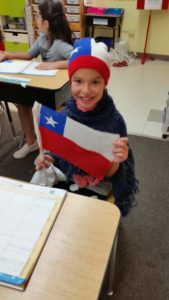
Celebrating Chile’s Independence day
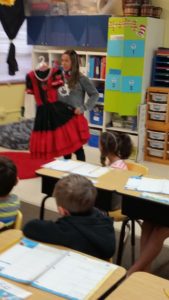
customs and traditions
History & Geography
This week we finished our study of Geography of the Americas. We focused on the Southern cone and the four countries within it. We listened to music from some of these countries while we did our morning work. The class learned about Evita Perón and the Great War of Paraguay. Tuesday was Chile’s independence day and Maestra Paola spoke to the class about some of the traditions surrounding this day. We also took our unit assessment on Tuesday. Thursday we began our next unit on India.
Our objectives
• locate and describe the four countries of the Southern cone
• describe and identify José de San Martin, Evita Perón, and Francisco López
• locate India on a map
• understand the Indus civilization
• understand the Aryan invasion of ancient India
• identify Hinduism as important world religion
Science
This week we continued our science domain: Cycles in Nature. The class learned about the four seasons in a year. We read the poem “Bee I’m Expecting You” by Emily Dickinson and explained how it describes spring.
Our objectives were to:
• explain that a cycle is a sequence of events that repeats itself again and again
• describe the seasonal cycles of spring, summer, autumn, and winter
• define the term life cycle
• identify the stages of the life cycle of a flowering plant (seed to seed)
• explain effects of seasonal changes on plants and animals
Spelling and Writing
In our journals we used the idiom of the week, ” he’s all tied up”. We are also working on creating a glossary of word wall words in the back of our journals. We did two spelling activities this week and had our spelling test on Friday. The class has been doing a great job of being responsible and getting all of their morning work done on time.
La lectura
This week we read ¡Regresa Jack!
Our weekly objectives were to:
- understand the meaning of our high frequency words for the week and practice spelling them: jugar, lejos, dijo, dibujar, escogí, escoge
- understand and use pronouns
- use the comprehension strategies Making Predictions and Making Connections during our first read
- use the comprehension skill Compare and Contrast as we read the second time
Las matemáticas
This week we continued learning about Numbers to 1,000. Our weekly objectives were to:
- compare numbers using the terms greater than and less than
- order three-digit numbers
- identify the greatest number, the least number, and number patterns
by Jill & Sarah | Sep 14, 2018 | In The Loop
History & Geography

Examining South American artifacts
This week we continued our study of geography of the Americas. We learned about the West Indies, South America, and the lands of the Andes. The class worked in small groups to make travel posters of the areas that we’ve learned about so far.
Our objectives
• understand how the West Indies were named
• describe physical and cultural a aspect of Puerto Rico
• locate the continent of South America
• describe important features of Brazil, Columbia, Venezuela, Suriname, Guyana, and French Guiana
• recognize geographical features of Peru, Ecuador, and Bolivia
• describe the lifestyles of people’s of the central Andes
Science
This week in we continued our science domain, Cycles in Nature. The class learned more about cycles and the reasons for seasons. We learned the poems “Bed in Summer” by Robert Lewis Stevenson and”Bee I’m Expecting You” by Emily Dickinson
Our objectives were to:
• explain that a cycle is a sequence of events that repeats itself again and again
• recognize that the rotation of Earth causes daytime and nighttime
• recognize that living things have a life cycle
• explain that it takes 24 hours for Earth to rotate once on its axis and one year for earth to orbit the Sun
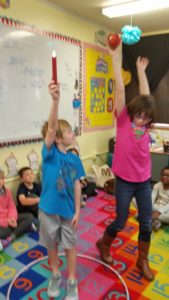
Earth revolves and rotates around the sun.
• explain effects of seasonal changes on plants and animals
Spelling and Writing
In our journals we used the idiom of the week, ” They’re in hot water”. We reviewed the word wall words that we have learned so far and the expectation for spelling them correctly in our writing. We began our spelling sorts this week and we had a practice test on Friday.
Las matemáticas
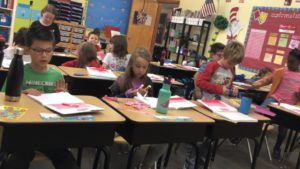 Our weekly objectives were to:
Our weekly objectives were to:
- use base-ten blocks and a place-value chart to read, write, and represent numbers to 1,000
- read and write numbers to 1,000 in standard form, expanded form, and word form
- count on by 1s, 10s, and 100s to 1,000
- use base-ten blocks to recognize, read, and write numbers to 1,000
- use base-ten blocks, greater than, less than, > and < to compare numbers
La lectura
This week we read Ant y los tres higuitos. Our weekly objectives were:
- use the comprehension strategies Making Connections and Visualizing when reading our story the first time
- use the comprehension skill Author’s Purpose when reading our story the second time
- learn and practice using common and proper nouns
- understand the meaning of our high frequency words for the week and practice spelling them
- practice reading at home and in class our first readers!
by Jill & Sarah | Sep 7, 2018 | In The Loop
History & Geography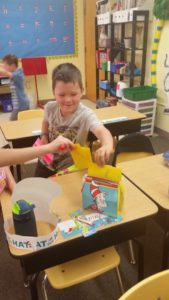
We had a great start to our new year this week. We began by celebrating our two September birthday’s. The class made birthday cards and our September birthday students got to have their pictures put up on the birthday bulletin board. This week we reviewed rules and routines for a classroom. We worked on a Dr. Seuss “All About Me” flip book and designed our unique Cat in the Hat hat for the bulletin board.
Our first unit of study is focusing on geography and maps. We learned about Canada and Mexico and Central America.
Our objectives:
• locate Canada, Mexico and Central America on a map
• recognize the Canadian and Mexican flag
• review how we use a compass rose
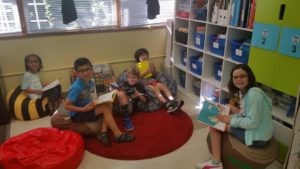 Science
Science
This week in we started our first science domain: Cycles in Nature. The class learned about the cycle of daytime and nighttime and the reasons for seasons.
Our objectives were to:
• draw a picture that explains what a plant needs to survive
• describe how the tilt of the earth and it’s hemispheres are affected by the Sun
Spelling and Grammar
In our journals we used the idiom of the week, ” it’s raining cats and dogs”. We reviewed the word wall words that we have learned so far and our expectation for spelling them correctly in our writing. The class began to work on their daily language work. For spelling this week we did an assessment inventory.
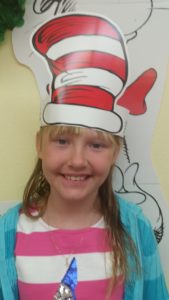
September Birthday Girl
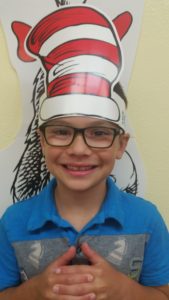
September Birthday Boy
La lectura
This week we began looking at our first unit: Sharing Stories.
Our weekly objectives were to:
- learn the expectations and procedures for readers and high frequency word activities
- review high frequency words from last year
- practice listening comprehension by listening to a story with no pictures
Las matemáticas
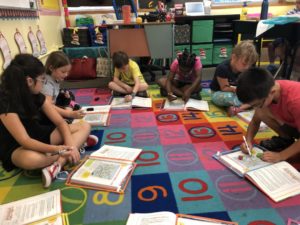
Using our new textbook covers!
Our weekly objectives were to:
- use base 10 blocks to recognize, read, and write numbers to 1,000
- count on by 1s, 10s, 100s, to 1,000
Specialists:
Music
I’m excited to be back for a second year teaching music at SWS!
September will be an engaging month full of hands-on rhythm learning and skill development. We will review concepts and skills covered last year, and build on them with activities involving the theoretical knowledge of beat counts, notation, and time signatures brought to life with group instrument playing, rhythmic spoken word, singing, and movement.
Character Education
We are focusing on manners and kindness this month (and really all year long!) and so we incorporated this into our activity on classroom rules. Then we did What’s in the Bag Wednesday where the kids have to feel a mystery object in a bag, but not peek, and then use one adjective to describe it. This week it was a golden ring, which went along with the book The Golden Rule. Treat others how you want to be treated is our quote of the month, and the book of course talked all about this. We will also have a poem each month, and this month it’s called “Manners”. We’ll practice again and again what it means to have good manners and to be kind to others!
Art
It was great seeing everyone back at school this week in Art! It’s fun to see how much everyone has grown over the summer! This week in Art the students made self portraits, and we also had time for a few apple drawings. These fun drawings are on the bulletin board at school.
For the rest of September, the students will work on drawing and painting a fall landscape, and we’ll start an India Rangoli design.
If you would like to help out in your child’s art class, there is a SIGN UP SHEET on the bulletin board to the left of the office. Thank you so much!
by Jill & Sarah | Jun 16, 2018 | In The Loop
Literatura
This week we read Historia oral. Our objectives were:
- rearrange parts of a story according to their time words into the correct order
- review and demonstrate understanding of antonyms
- review and use in colons sentences before lists, in between the hour and minutes when writing the time, and after a greeting in a letter
- to use comprehension strategies such a summarizing and making connections to construct meaning from the text
- to use the comprehension skill Author’s Purpose as we read our story the second time
Matemáticas
This week we continued working on our last chapter Area and Perimeter. Our objectives were:
- use square centimeter/meter and square inch/feet to find and compare the area of figures
- estimate the area of small and large surfaces
- find the perimeter of figures formed using small squares and by adding its sides
- compare the area and perimeter of two figure
- choose the appropriate tool and units of length to measure perimeter
- measure the perimeter of surfaces of objects and places
History & Geography
Social studies with Ms. Marci
Social studies with Ms. Marci.
We finished our unit on Colonial America this week. We read about William Penn and the history behind the founding of Pennsylvania and the Quakers. We also learned about what colonial life was like in the colonies and how the three regions differed. We learned about what factors contributed to the revolution. The class finished their lap books this week. Next Tuesday we will have our unit assessment, it will be an open note test.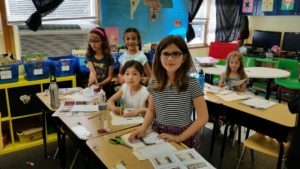
Our objectives were to:
• identify William Penn and the Dutch as keep people relative to the settlement of the Delaware colony
• explain that the lower counties of Pennsylvania became the colony of Delaware
• provide reasons why the Middle Atlantic became one of the fastest growing regions in Colonial America
• describe everyday life in the colonies
• compare and contrast colonial life with the present day
• describe the many conflicts among the French, English, and Native Americans
• describe some of the events that led to the American Revolution and explain the statement “no taxation without representation”
 Social Studies with Ms. Laura
Social Studies with Ms. Laura
We finished our unit on Civil Rights Leaders by learning about Cesar Chavez. He and the other people we studied really fought so hard for fairness and equality. We reviewed the unit by playing our own game show, “Who Am I?”, when we described, usually in just one sentence, our selected person and our “audience’ had to guess who we were. We completed more review, an assessment and a celebration. Thanks again for a great year!
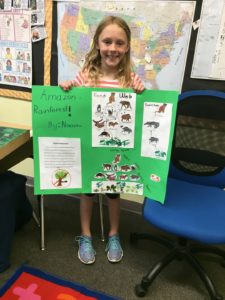 Science
Science
This week in our ecology domain we focused on what we can do to help our environment. The class continued to work on their science projects. We had some time on Tuesday to work on the chrome books.
Our objectives were to:
• list and explain ways that we can help to improve the environment
•give the definition of what a steward is and how that word can be applied to conservation
• describe and identify human made threats to the environment
• explain why sometimes animals must leave their habitats when the natural balance is lost
English Word Work
In our journals we used the word of the week “feign”. The class took a brief spelling assessment on Thursday.
Specialists
Art with Ms. Kelli
Our Visiting Artist:
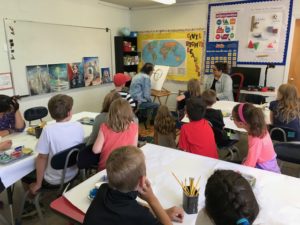 We were so glad to have Maestra Ivary’s father, Ivar Benavides, visit our school again and provide an amazing art lesson for each of our Art classes this week. Señor Ivar is an artist with a disability, having lost his arms in a childhood accident when he was 11 years old in Chile. Ivar brought in some more of his beautiful paintings, and he demonstrated his painting techniques on both portraits and landscapes, by holding the paintbrush in his mouth. The students were then able to try Ivar’s same technique by painting a picture using their mouth to hold the paintbrush. Everyone did a great job with this challenging art project! Señor Ivar explained that he learned to paint by practicing very hard, and he encouraged the students to always be determined to achieve their goals in spite of obstacles. Everyone was very inspired by Señor Ivar’s lessons about both art and life. Many thanks to Señor Ivar, and to Maestra Ivary who provided the new paintbrushes and so much assistance!
We were so glad to have Maestra Ivary’s father, Ivar Benavides, visit our school again and provide an amazing art lesson for each of our Art classes this week. Señor Ivar is an artist with a disability, having lost his arms in a childhood accident when he was 11 years old in Chile. Ivar brought in some more of his beautiful paintings, and he demonstrated his painting techniques on both portraits and landscapes, by holding the paintbrush in his mouth. The students were then able to try Ivar’s same technique by painting a picture using their mouth to hold the paintbrush. Everyone did a great job with this challenging art project! Señor Ivar explained that he learned to paint by practicing very hard, and he encouraged the students to always be determined to achieve their goals in spite of obstacles. Everyone was very inspired by Señor Ivar’s lessons about both art and life. Many thanks to Señor Ivar, and to Maestra Ivary who provided the new paintbrushes and so much assistance!
Dear Parents: I enjoy working with all your wonderful children! It is such a treat to see their unique creativity and enthusiasm in Art Class. Thank you to all the parents who assisted in the art room this year, and a special thank you to Stasia!
Have a Wonderful Summer!
by Jill & Sarah | Jun 9, 2018 | In The Loop
Literatura
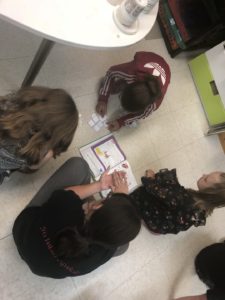
Area!
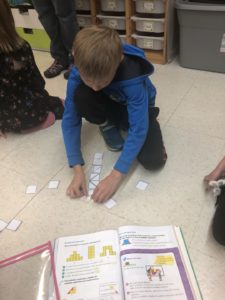 This week we read Un cuento, un cuento. Our objectives were:
This week we read Un cuento, un cuento. Our objectives were:
- understand and identify the setting of a story
- understand and write simple and compound sentences
- to use comprehension strategies such as predicting and summarizing to construct meaning from the text
- to use the comprehension skill sequence as we read the story a second time
Matemáticas
This week we finished our chapter on Two-Dimensional Shapes and began our last math chapter of the year Area and Perimeter. Our objectives were:
- slide, flip, and turn shapes to make congruent figures
- identify congruent figures and symmetric figures
- use folding to find a line of symmetry
- understand the meaning of area
- use square units to find the area of plane figures made of squares and half-squares
- compare the area of plane figures and make plane figures of the same area
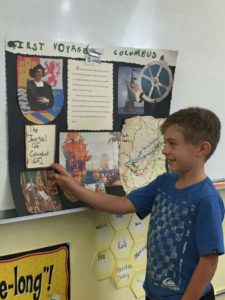 History & Geography
History & Geography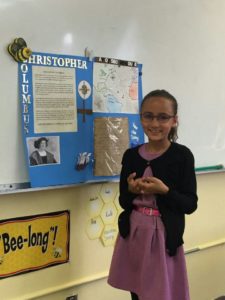
This week in our unit on Colonial America we read about the founding of Maryland and Georgia, religious freedom and the first Thanksgiving, religious dissent and the New England colonies, and the Middle Colonies. We had some interesting discussions about the difference between some of the groups of colonist, such as the pilgrims, puritans, and the Jamestown groups. On Tuesday we had our Explorer Project presentations. Everyone did an outstanding job! The class also enjoyed some snacks representing the countries their explorers originated from. We continue to work on our lap books for this unit.
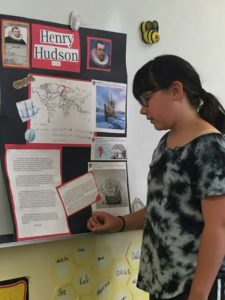 Our objectives were to:
Our objectives were to: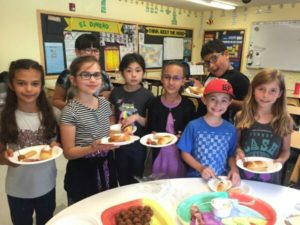
• list and locate the three colonial regions: New England, Middle Atlantic, Southern
• explain some of the early challenges faced by the English in establishing colonies in North America
• describe how everyday life and economic Industries in the three colonial regions were shaped by geography and climate
• describe the relationship between the colonists and Native Americans
• describe the industries and other characteristics of the three colonial regions
•Identify the three cash crops and their importance in southern colonies: tobacco, rice, and indigo
• describe the role of slavery in the colonial time period and why the southern colonies relied so much more heavily upon and slave labor than the middle colonies and the New England colonies
• Identify some of the industries of New England, such as Timber, shipbuilding, and fishing
• locate Plymouth Massachusetts and identify it as a New England colony
• identify 1620 is the year that the pilgrims came to Plymouth on the Mayflower
• identify Rodger Williams the Narragansett, and Anne Hutchinson, as people relative to the settlement of Rhode Island colony
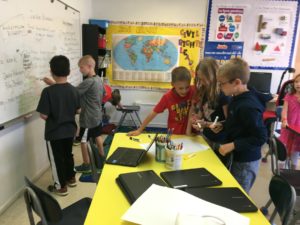 Social Studies with Ms. LauraWe continued our unit on Civil Rights Leaders by learning about Jackie Robinson, Ruby Bridges, Rosa Parks and Dr. Martin Luther King Jr. We read books about Ruby Bridges and Dr. Martin Luther King, Jr. Next week, we will finish up our unit by learning about Cesar Chavez. On Thursday, June 14th, we will review and have our assessment for this unit. Just a final word about this year: I have loved working with these bright and energetic students. Every day was full of questions and answers and enthusiasm. Thank you for sharing them!
Social Studies with Ms. LauraWe continued our unit on Civil Rights Leaders by learning about Jackie Robinson, Ruby Bridges, Rosa Parks and Dr. Martin Luther King Jr. We read books about Ruby Bridges and Dr. Martin Luther King, Jr. Next week, we will finish up our unit by learning about Cesar Chavez. On Thursday, June 14th, we will review and have our assessment for this unit. Just a final word about this year: I have loved working with these bright and energetic students. Every day was full of questions and answers and enthusiasm. Thank you for sharing them!
Science
This week in our ecology domain we learned more about human changes to the environment. Students are continuing to research and work on their ecosystem science project. These will be due on Tuesday June 19th. We will be presenting them in class. Each project should be centered around a chosen ecosystem. Each peoject will have four parts: a food chain, food web, energy pyramid, and a paragraph describing the possible impact of a natural disaster or human changes to their ecosystem.
Our objectives were to:
• explain why nature and ecosystems are not static but are constantly changing
• explain why sometimes animals must leave their habitats when the natural balance is lost
• explain how ecosystems are affected by changes in the environment
• explain how humans affect ecosystems and the environment
• describe and identify human made threats to the environment
• explain why sometimes animals must leave their habitats when the natural balance is lost
English Word Work
The class took our last spelling test this Friday. I encourage all the class to continue to work on the No Excuse Words over the summer so they know how to spell them all by next school year. We worked on a Father’s day surprise and practiced our song for the end of year program. In our journals we used the word of the week “slumber”.
by Jill & Sarah | Jun 1, 2018 | In The Loop
Literatura
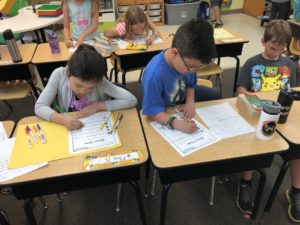
Writing our acrostic poems!
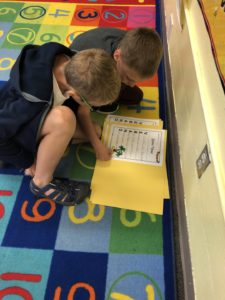 This week we completed our Unit Assessment. Our objectives were:
This week we completed our Unit Assessment. Our objectives were:
- students will demonstrate their understanding of grammar, vocabulary, and writing that was studied during this unit
- review what an acrostic poem is then write an acrostic poem about summer
Matemáticas
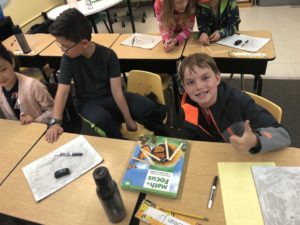
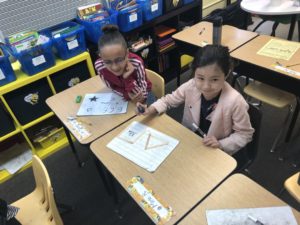
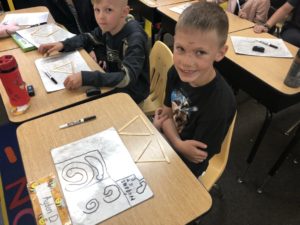
This week we began our new chapter Two-Dimensional Shapes. Our objectives were:
- identify open and closed figures
- identify special polygons and quadrilaterals
- classify quadrilaterals by parallel sides, length of sides, and angles
- combine and separate polygons to make other polygons
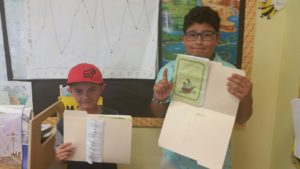
The beginning of our Colonial American lap books.
History & Geography
Social studies with Ms. Marci
This week we began our last unit on Colonial America. On Thursday we began to work on our lap books for this unit, the class made their time lines and Jamestown booklet. The class was reminded that our Explorer projects are due Tuesday, June 5.
Our objectives were to:
• Describe the impact Spanish, French, Portuguese, and Dutch exploration and Conquest in the Americas had on the english and their decision to settle parts of North America
• list and locate the three colonial regions: New England, Middle Atlantic, and Southern
• locate Roanoke Island in the southern region, and identify it as a failed English colonization attempt
• explain why Roanoke is known as the Lost Colony
• describe some of the reasons people came to North America from England and other countries
• explain some of the early challenges faced by the English in establishing colonies in North America
• describe how everyday life and economic Industries in the three colonial regions were shaped by geography and climate
• describe the relationship between the colonists and Native Americans
• describe the industries and other characteristics of the three colonial regions
• identify the Discovery, Susan Constant, and Godspeed as a three ships that brought English settlers to Jamestown
• identify King James, the Virginia Company of London, Pocahontas and the Powhatan, and Captain John Smith as key elements to the Jamestown Colony
• explain the term starving times as it relates to the Jamestown Colony
• describe the role of slavery in the colonial time period and why the southern colonies relied so much more heavily upon enslaved labor than the Middle and New England colonies
• compare and contrast indentured servants and enslaved laborers
• identify 1619 as the year the first known African laborers were brought to the colonies and that the first Africans in the English colonies came to Jamestown as indentured servants, not enslaved laborers
Social Studies with Ms. Laura We ended our unit on Immigration and Citizenship with a review and assessment, and our reports, presentations and celebration. The sharing of information, and food, was amazing! We started our final unit, Civil Rights Leaders, by learning about Susan B. Anthony, Mary McLeod Bethune, and Eleanor Roosevelt. We learned how these women worked hard to promote equality. They lived in different times and had different passions, but all were successful in helping people.
Science
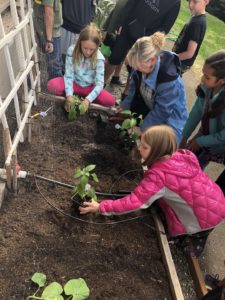
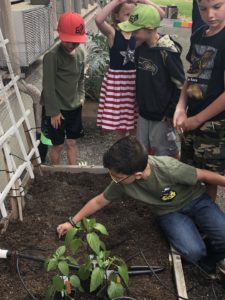
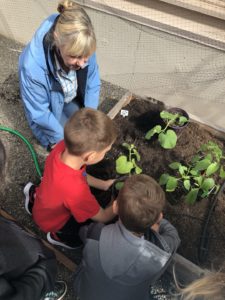
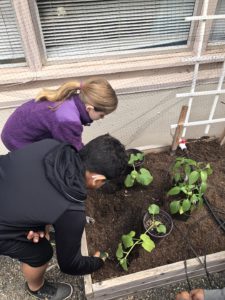
On Tuesday the class had the opportunity to do some planting in our school’s garden beds with Barbara and Russ. It was a great learning experience about the proper way to plant starts. This week in our ecology domain we learned more about natural changes and human changes to the environment. Students worked on their ecosystem project on Friday. These projects will mainly be done in class, they are due on Tuesday, June 19.
Our objectives were to:
• explain why nature and ecosystems are not static but are constantly changing
• explain why sometimes animals must leave their habitats when the natural balance is lost
• explain how ecosystems are affected by changes in the environment
• explain how humans affect ecosystems and the environment
• describe and identify human made threats to the environment
• explain why sometimes animals must leave their habitats when the natural balance is lost
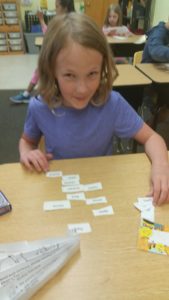 English Word Work
English Word Work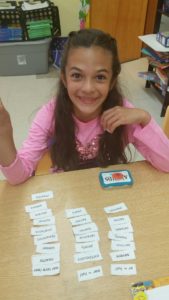
The class took our spelling test this Friday. Instead of grammar each person made a list of all the idioms they could think of. We will be doing more with these in the weeks to come. In our journals we used the word of the week “taunt”.
Specialists
Music with Ms. Erin
- In May we learned about and strengthened knowledge of music theory symbols, including: clefs, written notation, dynamic signs, the staff, bar lines, and the double bar.We learned all about the American composer Aaron Copland, and listened to his most popular works. We learned and sang the song In the Good Old Summertime.
We also started work on a new song that we will be performing for you!In June we will focus on:
- Music theory symbols such as quarter rests, and eighth notes (single and grouped)
- Singing pitch and rhythm
- Instrumental and collaborative performance skills
- Learning about Russian composer Nikolai Rimsky-Korsakov, and listening to his piece Scheherazade, Part One: “The Sea and Sinbad’s Ship”
Art with Ms. Kelly
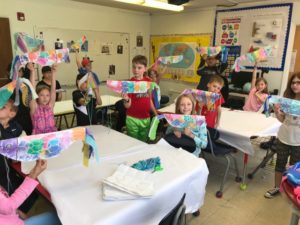 We displayed and admired all of our finished Mother’s Day “Tree Weavings,” and we read “Geraldine the Goat,” a fun story based on an actual Navaho rug weaver.
We displayed and admired all of our finished Mother’s Day “Tree Weavings,” and we read “Geraldine the Goat,” a fun story based on an actual Navaho rug weaver.
We made Koinobori or Carp Windsocks. The goals were:
- Learn about Children’s Day in Japan – May 5
- Draw and cut out a fish shape on paper
- Learn how to draw fish scales using oil pastels
- Add color and texture by using tissue paper and water
- Listen to Haiku poetry
- Thank you to Miria for helping us with the pronunciation and meaning of Koinobori!
Bald Eagle project (to celebrate Memorial Day, Flag Day, Independence day). Goals were to:
- Learn about our National Emblem and National holidays
- Observe photos of eagles: feathers, beak, talons, etc.
- Learn how to make and use a grid for drawing an eagle
- Learn how to use torn paper to create a collage of color and texture for the eagle
These beautiful collages are on the bulletin board at school!
We started a Pop Art project using summer flip flops as a theme. The goals are:
- Learn about Pop Art and look at some of Andy Warhol’s art
- Paint a background for our flip flop designs
- Design your own flip flops on paper
To be continued in June
by Jill & Sarah | May 26, 2018 | In The Loop
Literatura
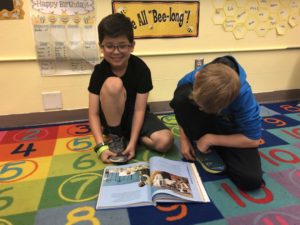
Reading our story of the week!
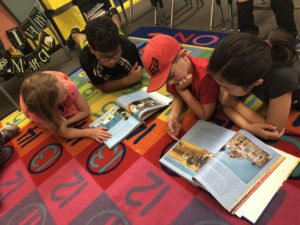 This week we read La peluquería del tío Jed.
This week we read La peluquería del tío Jed.
Our objectives were:
- review and use effective story starters and finishers
- review the endings -ado and -mente and create an anchor chart together
- use the comprehension strategies predicting and summarizing during our first read
- use the comprehension skill Cause and Effect as we read the story a second time
Matemáticas
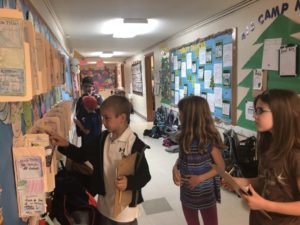
Finding parallel and perpendicular lines.
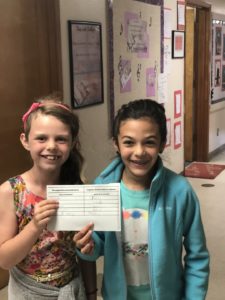 This week we began learning about angles and lines.
This week we began learning about angles and lines.
Our objectives were:
- Find angles in plane shapes and real-world objects
- Compare the number of sides and angles of plane shapes
- Compare angles to a right angle
- Identify right angles in plane shapes
- define and identify perpendicular lines and parallel lines
History & Geography
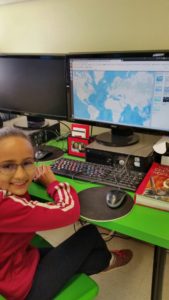 Social studies with Ms. Marci
Social studies with Ms. Marci
This week we wrapped up our unit on European Exploration of North America. We played jeopardy to review our unit, practiced our 1492 song, and took our unit assessment on Tuesday. The rest of our social studies class time this week was spent working on our Explorers Project, writing the biography and mock journal entries.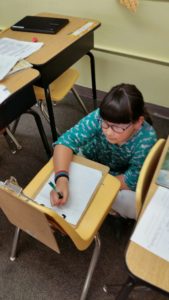
Our objectives were to:
• identify motivating factors that led to the exploration of the Americas in different expeditions
• locate on a map key places explored, such as the Caribbean Sea, the West Indies, the East Indies, Puerto Rico, Cuba, the Gulf of Mexico, the Mississippi River, the Grand Canyon, the Rio Grande, St. Augustine, Florida, Northwest Passage, Cape Breton Island, Newfoundland, Canada, the Hudson Bay, the Lawrence River, and the Great Lakes
• explain why Kings and queens in Europe interested in exploring the Atlantic and they area to the west of Europe
• describe the purpose of Missionary settlements in early Spanish exploration
• explain the importance to the Europeans of finding a Northwest Passage
• identify similarities and differences between John Cabot and Christopher Columbus
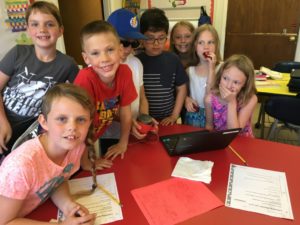 Social Studies with Ms. LauraWe learned about three famous immigrants: Andrew Carnegie, Albert Sabin and Irving Berlin. We learned that the 100th birthday celebration for Irving Berlin was held in Carnegie Hall! We talked how immigrants, with varied life experiences, add so much to America. We talked about becoming a citizen of The United States of America, the requirements, the rights and the responsibilities. PROJECT FINAL REMINDER: Immigration reports are due, and presentations will be, on Tuesday, May 29th. Students are encouraged to dress up, bring ‘stuff’ (items, photos, posters) to show and a food to share. A one page (handwritten or typed) report will be turned in and a three to five minute presentation will be shared. We have talked about this project in class and they know what they need to do! Feel free to join us around 1:15 p.m. on May 29th! Thanks for your help!
Social Studies with Ms. LauraWe learned about three famous immigrants: Andrew Carnegie, Albert Sabin and Irving Berlin. We learned that the 100th birthday celebration for Irving Berlin was held in Carnegie Hall! We talked how immigrants, with varied life experiences, add so much to America. We talked about becoming a citizen of The United States of America, the requirements, the rights and the responsibilities. PROJECT FINAL REMINDER: Immigration reports are due, and presentations will be, on Tuesday, May 29th. Students are encouraged to dress up, bring ‘stuff’ (items, photos, posters) to show and a food to share. A one page (handwritten or typed) report will be turned in and a three to five minute presentation will be shared. We have talked about this project in class and they know what they need to do! Feel free to join us around 1:15 p.m. on May 29th! Thanks for your help!
Science
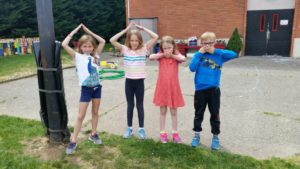
“Oh Deer”
This week in our ecology domain we learned more about the balance of nature and natural changes to the environment. The class played “Oh Deer”, a game that demonstrates the balance of nature. We also discussed the final project for this unit. Students will choose an ecosystem and create a food chain, food web, and energy pyramid for that ecosystem
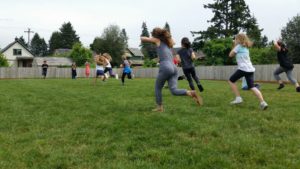
A fun game to learn about balance in ecosystems
.
Our objectives were to:
• describe the balance of nature in an ecosystem
• explain how changes in an ecosystem are caused by natural events and by humans
• explain why nature and ecosystems are not static but are constantly changing
• explain why sometimes animals must leave their habitats when the natural balance is lost
• explain how ecosystems are affected by changes in the environment
English Word Work
The class took our spelling test this Friday. For grammar we reviewed prepositions and prepositional phrases. The students went on a preposition scavenger hunt. In our journals we used the word of the week “scrumptious” in one entry and in another the class wrote about the idiom “On its last leg”.
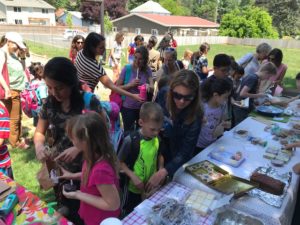 Character Education Bake Sale
Character Education Bake Sale
Thank you all for coming out and supporting our “Buy a Goat” Bake Sale! It was an amazing success and we raised almost $450!! ($448.75 to be exact). Wow! Thanks so much for donating, buying, and showing up to the sale. Your generosity is amazing! The 4th and 5th graders did a great job of hosting it and we are proud of them. Next week all classes will have the chance to vote on the animals we purchase through Heifer International.
by Jill & Sarah | May 19, 2018 | In The Loop
Literatura
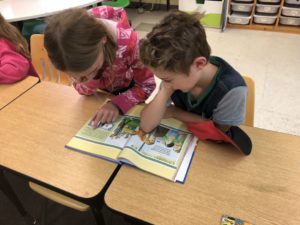
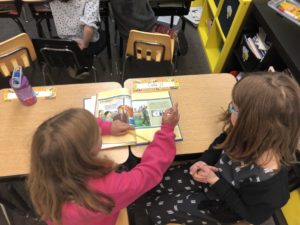 This week we read El dólar viajero.
This week we read El dólar viajero.
Our objectives were:
- to understand and identify sequence within out story using words that indicate time and order
- practice conjugating our -ir verbs
- use comprehension strategies asking questions, making connections, and summarizing to construct meaning from the text during our first read
- review adverbs and practice using them within sentences
Matemáticas
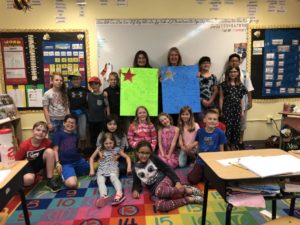
Thank you so much for all the wonderful gifts and goodies! We love our Love our students and families!
This week we finished our unit on time and temperature.
Our objectives were:
- Find elapsed time
- Read a Fahrenheit thermometer
- Choose the appropriate tool and unit to measure temperature
- Use a referent to estimate temperature
- Solve up to two-step word problems on time
- Solve word problems involving temperature
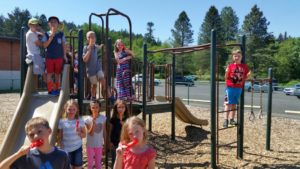 History & Geography
History & Geography
Social studies with Ms. Marci
This week in our unit on European Exploration of North America we learned about the expeditions Henry Hudson and Samuel de Champlain. We continue to work on our vocabulary and travel log note-taking as well as our end of unit project.
Our objectives were to:
• identify motivating factors that led to the exploration of the Americas in different expeditions
• locate on a map key places explored and visited by the Spanish and English.
• explain the importance to Europeans of finding a Northwest Passage
• describe the contributions of Henry Hudson and Samuel de Champlain in exploring North America in search of the Northwest Passage
• locate the Hudson River, the Hudson Bay, Quebec, Canada, the Saint Lawrence River, and the Great Lakes on a map
• describe the purpose of missionaries during French exploration of North America
• describe the encounters between early explorers and Native Americans
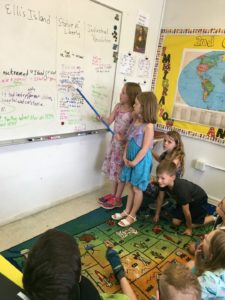 Social Studies with Ms. Laura We continued our study of immigration and citizenship by learning about Ellis Island and the Statue of Liberty. We learned about what life was really like for many immigrants who came to America. We write letters to friends and family in our ‘homelands’ describing our journey to and our life in America.
Social Studies with Ms. Laura We continued our study of immigration and citizenship by learning about Ellis Island and the Statue of Liberty. We learned about what life was really like for many immigrants who came to America. We write letters to friends and family in our ‘homelands’ describing our journey to and our life in America.
PROJECT ALERT REMINDER: The students will gather information about an immigrant. This might be a family member, a friend or someone famous. The students have suggested questions to answer. They are encouraged to be creative, to learn some things and to have fun! At least one page (handwritten or typed) will be turned in and an oral report (between three and five minutes) will be presented on Tuesday, May 29th. Students may dress up, may bring ‘stuff’ that is relevant and are invited to bring some food to share. We have talked about this project in class and they know what they need to do!
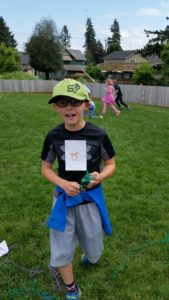
Being on the top of the food chain is hard work!
Feel free to join us around 1:15 p.m. on May 29th! Thanks for your help!
Science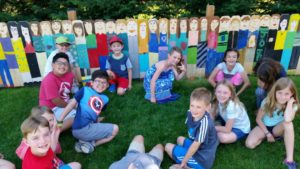
This week in our ecology domain we learned about the balance of nature. The class was already asking questions about this before we got to the lessons. They wondered what would happen if a link, or trophic level was eliminated from the chain. On Tuesday we made a food web to demonstrate all the interconnections that exist in nature. On Friday the class had fun playing “Oh Deer” a game that demonstrates an in balance of nature.
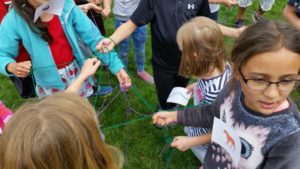
Making a food web game
Our objectives were to:
• provide an example of a food chain in a given food web
• explain why nature and ecosystems are not static but are constantly changing
• describe the balance of nature in an ecosystem
• explain how changes in an ecosystem are caused by natural events and by humans
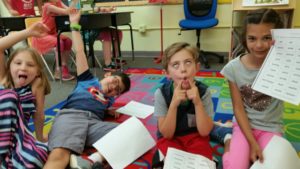
Monkey group being monkeys
English Word Work
The class took our spelling test this Friday. For grammar we reviewed interjections. In our journals we used the word of the week “jaunt” in one entry and in another the class described a food chain that might be found in their back yard.
 Science
Science
 This week we took our first math test and began Chapter 2: Addition up to 1,000. Our weekly objectives were to:
This week we took our first math test and began Chapter 2: Addition up to 1,000. Our weekly objectives were to:





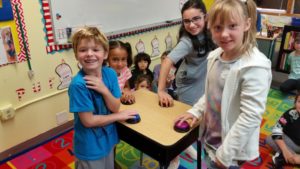









 Social Studies with Ms. Laura
Social Studies with Ms. Laura
 We were so glad to have Maestra Ivary’s father, Ivar Benavides, visit our school again and provide an amazing art lesson for each of our Art classes this week. Señor Ivar is an artist with a disability, having lost his arms in a childhood accident when he was 11 years old in Chile. Ivar brought in some more of his beautiful paintings, and he demonstrated his painting techniques on both portraits and landscapes, by holding the paintbrush in his mouth. The students were then able to try Ivar’s same technique by painting a picture using their mouth to hold the paintbrush. Everyone did a great job with this challenging art project! Señor Ivar explained that he learned to paint by practicing very hard, and he encouraged the students to always be determined to achieve their goals in spite of obstacles. Everyone was very inspired by Señor Ivar’s lessons about both art and life. Many thanks to Señor Ivar, and to Maestra Ivary who provided the new paintbrushes and so much assistance!
We were so glad to have Maestra Ivary’s father, Ivar Benavides, visit our school again and provide an amazing art lesson for each of our Art classes this week. Señor Ivar is an artist with a disability, having lost his arms in a childhood accident when he was 11 years old in Chile. Ivar brought in some more of his beautiful paintings, and he demonstrated his painting techniques on both portraits and landscapes, by holding the paintbrush in his mouth. The students were then able to try Ivar’s same technique by painting a picture using their mouth to hold the paintbrush. Everyone did a great job with this challenging art project! Señor Ivar explained that he learned to paint by practicing very hard, and he encouraged the students to always be determined to achieve their goals in spite of obstacles. Everyone was very inspired by Señor Ivar’s lessons about both art and life. Many thanks to Señor Ivar, and to Maestra Ivary who provided the new paintbrushes and so much assistance!





 Social Studies with Ms. LauraWe continued our unit on Civil Rights Leaders by learning about Jackie Robinson, Ruby Bridges, Rosa Parks and Dr. Martin Luther King Jr. We read books about Ruby Bridges and Dr. Martin Luther King, Jr. Next week, we will finish up our unit by learning about Cesar Chavez. On Thursday, June 14th, we will review and have our assessment for this unit. Just a final word about this year: I have loved working with these bright and energetic students. Every day was full of questions and answers and enthusiasm. Thank you for sharing them!
Social Studies with Ms. LauraWe continued our unit on Civil Rights Leaders by learning about Jackie Robinson, Ruby Bridges, Rosa Parks and Dr. Martin Luther King Jr. We read books about Ruby Bridges and Dr. Martin Luther King, Jr. Next week, we will finish up our unit by learning about Cesar Chavez. On Thursday, June 14th, we will review and have our assessment for this unit. Just a final word about this year: I have loved working with these bright and energetic students. Every day was full of questions and answers and enthusiasm. Thank you for sharing them!











 We displayed and admired all of our finished Mother’s Day “Tree Weavings,” and we read “Geraldine the Goat,” a fun story based on an actual Navaho rug weaver.
We displayed and admired all of our finished Mother’s Day “Tree Weavings,” and we read “Geraldine the Goat,” a fun story based on an actual Navaho rug weaver.





 Social Studies with Ms. LauraWe learned about three famous immigrants: Andrew Carnegie, Albert Sabin and Irving Berlin. We learned that the 100th birthday celebration for Irving Berlin was held in Carnegie Hall! We talked how immigrants, with varied life experiences, add so much to America. We talked about becoming a citizen of The United States of America, the requirements, the rights and the responsibilities. PROJECT FINAL REMINDER: Immigration reports are due, and presentations will be, on Tuesday, May 29th. Students are encouraged to dress up, bring ‘stuff’ (items, photos, posters) to show and a food to share. A one page (handwritten or typed) report will be turned in and a three to five minute presentation will be shared. We have talked about this project in class and they know what they need to do! Feel free to join us around
Social Studies with Ms. LauraWe learned about three famous immigrants: Andrew Carnegie, Albert Sabin and Irving Berlin. We learned that the 100th birthday celebration for Irving Berlin was held in Carnegie Hall! We talked how immigrants, with varied life experiences, add so much to America. We talked about becoming a citizen of The United States of America, the requirements, the rights and the responsibilities. PROJECT FINAL REMINDER: Immigration reports are due, and presentations will be, on Tuesday, May 29th. Students are encouraged to dress up, bring ‘stuff’ (items, photos, posters) to show and a food to share. A one page (handwritten or typed) report will be turned in and a three to five minute presentation will be shared. We have talked about this project in class and they know what they need to do! Feel free to join us around 

 Character Education Bake Sale
Character Education Bake Sale



 Social Studies with Ms. Laura We continued our study of immigration and citizenship by learning about Ellis Island and the Statue of Liberty. We learned about what life was really like for many immigrants who came to America. We write letters to friends and family in our ‘homelands’ describing our journey to and our life in America.
Social Studies with Ms. Laura We continued our study of immigration and citizenship by learning about Ellis Island and the Statue of Liberty. We learned about what life was really like for many immigrants who came to America. We write letters to friends and family in our ‘homelands’ describing our journey to and our life in America.


